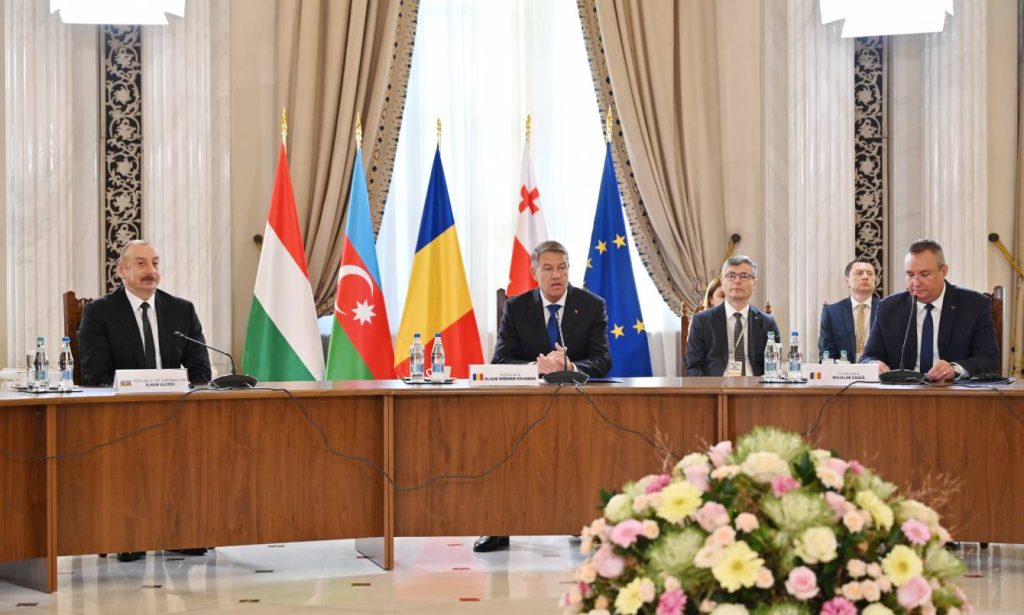Elvira Kadyrova
The longest electric cable in the world will connect Azerbaijan and Europe, laying a green energy bridge between the Caspian region and the EU.
On 17 December 2022, Bucharest hosted the signing of the Agreement on a strategic partnership in the field of green energy development and transmission between the Governments of the Republic of Azerbaijan, Georgia, Romania and Hungary, in the presence of President Ilham Aliyev,
President of Romania Klaus Iohannis, President of the European Commission Ursula von der Leyen, Prime Minister of Georgia Irakli Garibashvili and Prime Minister of Hungary Viktor Orban.
According to the deal, a 1,100 km long cable with a capacity of 1,000 MW will stretch from Azerbaijan’s wind farms in the Caspian Sea to Romania.
Hungarian Foreign Minister Peter Szijjarto said the European Commission has agreed to invest 2.3 billion euro in this project.
The feasibility study for the project will be ready in 2023, and the cable connection will materialize within three to four years.
At the quadrilateral meeting, the Romanian President stressed: “As the next step, our ambition is that the digital cable is laid alongside the submarine electricity power line. We envisage the expansion of the maritime transportation links towards Georgia from our harbor in Constanța. These endeavors will enhance connectivity with Azerbaijan and further onto Central Asia. A lot of work ahead of us to tap the potential and increase our resilience.”
Ursula von der Leyen said: “To integrate a growing share of renewables, we indeed need stronger electricity interconnections. And this is why the Black Sea electric cable between Romania, Georgia and Azerbaijan is so important. And I can only say: What an ambitious project. It would connect us on both sides of the Black Sea and run further towards the Caspian Sea region – both for digital communication and for energy. It will help reinforce our security of supply by bringing electricity from renewable sources to the European Union, via Romania and through Hungary.”
Baku has announced quite ambitious targets for the development of renewable energy and hopes to become not only a producer of green energy, but also a major exporter. According to the Azerbaijani leader, Azerbaijan’s renewable energy potential is more than 27 gigawatts of wind and solar power onshore and 157 gigawatts of wind power in the Azerbaijani sector of the Caspian Sea.
By 2027, the country aims to produce 3 gigawatts of wind and 1 gigawatt of solar energy, 80 % of which will be exported.
By 2037, Azerbaijan plans to create additional capacities of at least 6 gigawatts.
Last week, the Ministry of Energy of Azerbaijan and the Australian Fortescue Future Industries (FFI) signed a framework agreement on joint cooperation on the study and development of renewable energy projects and the potential of “green hydrogen” in Azerbaijan. The contract provides for the research and implementation of projects with a total capacity of up to 12 GW for the production of renewable energy and “green hydrogen” in Azerbaijan.
“So, at least 3 gigawatts of additional transmission capacity should be created for the first phase of Azerbaijani export,” Ilham Aliyev concluded.
However, even if the green energy does not flow immediately, there will be a slight increase in gas supplies from Azerbaijan to the EU next year.
According to President Aliyev, in 2021 Azerbaijan’s natural gas exports to the EU market amounted to 8.2 billion cu m, this year – 11.3 billion cu m, and in 2023 11.6 billion cubic meters will be delivered at least.
In addition, last week the State Oil Company of the Republic of Azerbaijan (SOCAR) and Romgaz S.A. concluded a contract for the supply of gas from Azerbaijan to Romania from 1 January 2023.
“Thus, Azerbaijan is expanding the geography of its gas supplies to the European market. This situation is beneficial for all parties. Europe needs to strengthen its energy security, and Azerbaijan needs a reliable market for its huge energy resources,” Ilham Aliyev said.///nCa, 20 December 2022
